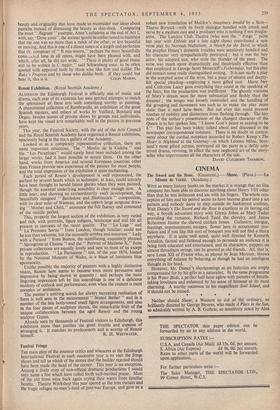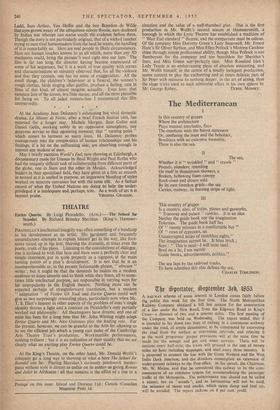CINEMA
The Sword and the Rose. (Gaumont.)—Shane. (Plaza.)—La Minute de Write. (Academy.) Wax so many history books on the market it is strange that no film company has been able to discover anything about Henry VIII other than that he was lecherous and ate with his fingers. The whole con- ception of him and his period seems to have become glued into a set pattern and nobody dares to step outside its hackneyed confines. Walt Disney's The Sword and the Rose is excellent in its boring old way, a boyish adventure story with Glynis Johns as Mary Tudor providing the romance, Richard Todd the chivalry, and James Robertson Justice the chewed chicken bones. Gallantry, intrigue, feastings, imprisonments, escapes, flower here in accustomed pro- fusion and if you like this sort of bouquet you will not find a thorn anywhere. It is quite well acted, quite well directed by Kenneth Annakin, factual and fictional enough to persuade an audience it is being both educated and entertained, and its characters, puppets on almost threadbare strings, can be greeted as old friends. All, that is, save Louis XII of France who, as played by Jean Mercure, throws everything off balance by behaving as though he had an intelligent thought in his head. , However, Mr. Disney's shortcomings as an historian are amply compensated for by his gifts as a naturalist. In the same programme is his Water Birds, a perfect half-hour aglow with pictures of breath- taking loveliness and enhanced by his sense of humour at its most' charming. A worthy successor to his magnificent Seal Island, and it should not be missed.
Neither should Shane, a Western so out of the ordinary, so brilliantly directed by George Stevens, who made A Place in the Sun, so admirably written by A. B. Guthrie, so sensitively acted by Alan Ladd, Jean Arthur, Van Heflin and the boy Brandon de Wilde that eyes grown weary of the ubiquitous saloon floozie, ears deafened by Indian war whoops can scarce credit the evidence before them. Though the story is not particularly original, that of a wicked rancher trying to oust rival homesteaders from the land he wants, the handling of it is remarkably so. Here are real people in likely circumstances. Here are human touches known to us all which, more than any 3D mechanics could, bring the pioneer's west right into our laps.' The film is far too long, the director having become enamoured of some of his sequences, but it is a work of true quality with scenes and characterisations so minutely observed that, for all the violence and fear they contain, one has no sense of exaggeration.' All the small things, the children's behaviour at a funeral, the women's rough clothes, birds singing after gunfire, produce a feeling, rare in films of this kind, of almost tangible actuality. Even love, that rampant lion of the screen, is-a little mouse, and all the more plausible for being so. To all jaded western-fans I recommend this film unreservedly. * At the Academy Jean Delannoy's exhausting but vivid domestic drama, La Minute de Write, after a brief French festival visit, has returned for a longer stay. Michele Morgan, Jean Cabin and Daniel Gelin, working nobly in an oppressive atmosphere, pay generous service to that agonising moment, that " turning point " which conies to torment so many lives. M. Delannoy probes courageously into the complexities of human relationships and his findings, if a bit on the suffocating side, are absorbing enough to interest any student of man. May I briefly mention World's End, now showing at Edinburgh, a documentary made for Unesco by Basil Wright and Paul Rotha who had the uniquely difficult task of collaborating from different parts of the globe, one in Siam and the other in Mexico. Acknowledged leaders in their specialised field, they have given us a film as smooth in texture as it is unified in purpose, an impressive blending of styles worked on separate canvasses but with the same silk. As a factual record of what the United Nations are doing to help the under- privileged it is inadequate and, perhaps, trite. As a work of art it is



































 Previous page
Previous page